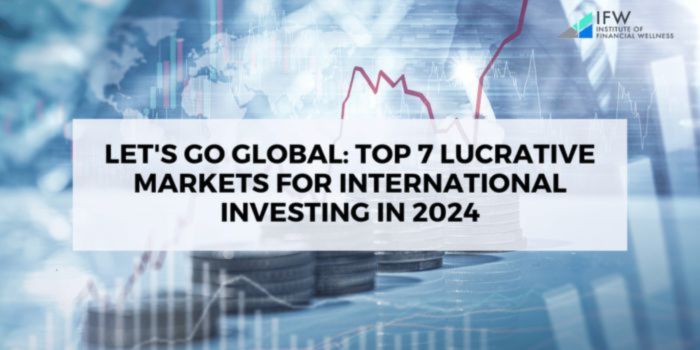“Retirement: When you stop living at work and start working at living.” — Unknown
Consider international investing for your portfolio in 2024? Buckle up because we are about to unveil the top markets for international investing alongside strategies to diversify your assets and optimize growth! You’ll learn how to balance potential risks with the rewards of expanding your investment horizon globally. Get ready to unlock the potential of the world’s economies and give your portfolio a competitive edge, which will also increase your retirement score.
Key Takeaways
- International investing provides opportunities to diversify portfolios, mitigate risk, and access a broader range of economic growth opportunities across various markets.
- Investing in global markets presents specific challenges, such as political and economic instability, currency volatility, and diverse regulatory environments, but with proper strategies and knowledge, these risks can be managed.
- Using investment vehicles like mutual funds, ETFs, and direct stock investments can help investors navigate international markets, and partnering with a financial advisor can offer tailored advice for successful global investment strategies.
Exploring the World of International Investing

Imagine the thrill of embarking on a global adventure from the comfort of your home. International investing offers just that – a journey across diverse economies, cultures, and markets. It’s not just about earning potential returns; it’s about participating responsibly in global economic growth and enhancing personal financial well-being.
The world of international investing is vast, ranging from stocks and bonds to mutual funds and ETFs. Each investment option carries its potential return and the level of knowledge required for effective management. However, the true beauty of international investing lies in its ability to extend your financial reach beyond the confines of domestic markets. It’s an open invitation to diversify your investment portfolio and tap into the pulsating energy of emerging markets and international economic growth.
The Benefits of Casting a Wider Net

Why confine your investment horizons to the known when a vast global expanse awaits? Adding international investments can greatly improve portfolio diversity and curb volatility. Diversifying risk through various economies, you pave the way for possibly greater returns.
Now, let us explore the advantages of expanding your financial reach globally by examining effective methods to pool investors’ money.
Diverse Portfolio
Diversification is the safety net of investing. By including stocks and bonds from companies outside the U.S., one can create a diversified portfolio, which minimizes potential losses. Attaining an optimal balance between investments in developed and emerging markets is key to this strategy.
Investments in developed markets are associated with lower risk due to their economic stability, whereas emerging markets offer potentially higher returns but come with greater volatility. A robust international portfolio encompasses a blend of assets from both market types. Beyond geographic diversification, it’s crucial to spread your investment across various stocks wisely so as not to concentrate too heavily on any single area.
For example, opting for smaller European firms over only investing in large corporations could lead to a stable investment that presents both security and avenues for growth.
Economic Growth Opportunities
The lure of emerging markets lies in their vibrant growth dynamics, often distinct from those of the U.S. market. These markets offer a plethora of economic growth opportunities backed by unique factors. For instance, India’s rapid economic escalation is powered by a digital revolution, with formidable strides in fintech and a rapidly expanding smartphone user base.
While developed markets like the U.S. and the UK are known for their stability and potential dividends from mature companies, emerging markets offer higher growth prospects amid increased risks, especially in Asia. Here, open trade policies and tax approaches can significantly impact foreign direct investments. In a world where the winds of economic fortune shift rapidly, these factors can make a substantial difference in the success of your international investments.
Currency Diversification
Diversifying across different currencies is a vital part of global investment strategies, protecting against the possible decline in the value of an investor’s own currency. By placing funds in nations with robust and ascending currencies and higher interest rates, one can safeguard their investments from adverse shifts in currency values.
Yet it must be recognized that investing carries inherent risks, including the dual-natured risk associated with currency. Exchange rate volatility has the capacity to greatly affect your investment’s worth. Vigilant monitoring of exchange rate trends and adjusting your approach to investing as needed are imperative practices for maintaining a sound investment strategy.
Navigating the Risks of Global Markets
Diving into global markets offers an array of opportunities for investment, yet it is not without its potential hazards. Investors embarking on international investments may encounter a variety of challenges, such as:
- Unstable political and economic conditions
- Fluctuating currency values
- Elevated costs associated with transactions
- Risks pertaining to the ease of converting assets to cash
There’s no need to be overly concerned. Equipped with appropriate insights and tactics, one can adeptly maneuver through these risks.
We shall now explore in greater detail these aforementioned risks, along with methods for effectively mitigating them while investing internationally.
Political and Economic Stability
Assessing the potential risks and returns of international investments is heavily dependent on the stability of a country’s political and economic climate. Investors can utilize instruments like risk reports and sovereign credit ratings to gauge a nation’s level of risk, thereby helping them avoid unforeseen financial losses.
Investors might consider factors such as Brazil’s monetary reforms or Saudi Arabia’s socio-economic measures, which enhance their appeal for global investment portfolios. Being well-informed about these local geopolitical occurrences can greatly diminish the dangers tied to investing in burgeoning market economies [1].
Understanding Currency Risks
Currency risk, a critical element in international investing, surfaces when investment values are subject to exchange rate fluctuations. These shifts can considerably alter the gains and losses for those who invest across borders. For example, returns on bonds could be drastically affected by this kind of risk—it has the power to double or erase profits upon converting back to another currency.
To safeguard against currency risk, investors have several strategies available.
- Spreading their investments over various global locations
- Opting for funds that employ hedging tactics against currency movements
- Allocating capital into countries whose currencies maintain a fixed exchange rate with the U.S dollar
Nevertheless, vigilance regarding central bank actions that may adjust these pegs is vital since they hold significant sway over investment outcomes.
Regulatory Considerations
Navigating the intricacies of global markets involves a crucial element: understanding regulatory considerations. Factors like sector-specific constraints and national security reviews are instrumental in shaping both the viability and potential triumphs of investments across international borders. Grasping these regulatory frameworks is essential to making informed investment decisions, as it guarantees adherence to a country’s legal standards where the investment is being made.
Investment Vehicles for Going Global

Having examined the pros and cons of investing in international markets, it’s time to look at various instruments that can channel your capital into the global economic landscape. The options for such investments include:
- Portfolios with an international scope
- Investments focused on particular regions or countries
- Mutual funds
- Exchange-traded funds (ETFs)
- Direct investments in stocks
All these vehicles present varying degrees of risk and potential return.
We will now scrutinize each instrument to grasp how it facilitates a worldwide investment strategy.
Mutual Funds
Mutual funds present an excellent option for those looking to diversify their investment portfolio internationally. By collecting capital from multiple investors, these funds make it possible to venture into both established and developing markets worldwide. Every mutual fund holds a mixture of asset categories that are designed with various risk and return profiles in mind, accommodating the different investment appetites of individual investors.
For example, international fixed-income funds allow individuals to invest in government bonds and corporate debt securities beyond American borders, opening up another channel for income generation and portfolio variation. Likewise, high-grade mutual funds focusing on developed European economies can amplify profit prospects within a globally diversified investment strategy. They stand as compelling substitutes when considering alternative investments like corporate bond funds or options with higher yield savings characteristics.
Exchange Traded Funds (ETFs)
Investing internationally has been made more flexible through ETFs. These are similar to mutual funds in that they enable investors to purchase a diversified collection of securities. Yet, they also have the advantage of being traded similarly to individual stocks.
Not only do ETFs facilitate diversification, but they also offer cost efficiencies due to their lower investment management fees when compared with alternative investment options. ETFs present an ideal solution for investors who might lack the capital necessary to satisfy the minimum investment criteria typical of mutual funds.
Direct Stock Investments
Let’s take a moment to discuss the merits of direct stock investments. Should you be an investor whose holdings are spread across a well-diversified portfolio and who has an appetite for risk, then direct investment in stocks could align with your financial interests. This approach grants you shareholder status in international firms, giving you a firsthand stake in their expansion.
Take Roche Holding as an example. It is recognized as one of the premier choices for investors seeking opportunities for direct investment in stocks, presenting substantial valuation potential to those who choose to invest [2].
Assessing Your International Exposure
Engaging in international investing involves more than capitalizing on potential prospects. It also requires a keen awareness of the risks involved. When considering your global exposure, it’s essential to evaluate your existing investments and ensure they are coordinated with your investment objectives. You should also weigh the balance between risk and reward.
To Explore how you can precisely gauge your exposure in international markets, let us delve into the intricacies of this process.
Reviewing Current Investments
Begin by examining your existing investments to gauge your level of international exposure, considering both local and global reach within your investment portfolio. You might find that you have foreign investments across a variety of accounts, such as retirement funds, conventional brokerage accounts, and education-related savings accounts. Analyzing these can help mitigate domestic favoritism in investing while possibly increasing opportunities for growth.
To establish an appropriate proportion of equity in your portfolio, there’s a straightforward heuristic: subtract your age from 110. This calculation can serve as a guideline for balancing stocks within your overall investment strategy.
Aligning with Investment Objectives
After evaluating your current financial portfolio, ensuring that it matches your investment objectives is essential. The appropriateness of various financial instruments like investment accounts, savings accounts, and mutual funds can vary depending on your specific long-term goals and the timeline you have in mind for your investments. Index mutual funds are especially favorable for those aiming at long-term saving aspirations because they offer lower costs and reduced volatility – attributes particularly advantageous for younger investors planning over an extended period.
Small-cap stock funds could be compelling options for individuals seeking substantial returns over a prolonged duration. These investors should be prepared to commit their resources for a minimum of three to five years to capitalize fully on these types of investments.
Balancing Risk and Reward
The last step to managing your global investment exposure is to harmonize the potential risks and rewards. This requires selecting investment options that correspond with your appetite for risk and your financial aspirations. For example, dividend stocks dispense consistent cash distributions to their owners, indicating they originate from well-established and profitable businesses. These stocks are fitting choices for investors at varying levels of experience, from novices to those enjoying retirement.
Investors should regularly review their portfolio composition in relation to their intended financial targets and individual comfort with risk-taking. Government bond funds, which focus on investments in government securities, provide a reliable flow of income while maintaining lower volatility—a feature particularly appealing to cautious investors. During periods when the stock market struggles, these bonds often act as a stabilizing force.
To effectively deal with fluctuations in the market without having to withdraw investments ahead of schedule, mainly because finances become tight or an unexpected expense arises. An investor should keep debt within reasonable bounds along with setting up a solid emergency fund provision.
Strategic Tax Planning for Global Investments
Tax planning is an essential component of your strategy as an international investor. This entails understanding the tax consequences in foreign jurisdictions and optimizing for tax effectiveness. We will explore the nuances of tactical tax planning within the realm of worldwide investments.
Understanding Tax Implications Abroad
Investors expanding their portfolios with international securities should be mindful of the tax implications in foreign countries, as these will impact overall returns and adherence to global regulations. When investing overseas, it’s essential to consider not only U.S. income tax obligations but also any taxes imposed by the nation where the company is based.
Maximizing Tax Efficiency
Achieving tax efficiency is a pivotal element of smart tax planning. Consider these guidelines to enhance your strategy.
- Opt for the foreign tax credit over deductions when reducing U.S. taxation, as it typically results in greater savings.
- Embrace investments like index funds and ETFs, known for their tax efficiency.
- Implement asset location strategies that can help grow after-tax returns.
Adhering to these steps allows you to refine your approach toward minimizing taxes.
Implementing tactics such as tax-loss harvesting can Elevate your strategy’s effectiveness by selling off underperforming investments to counterbalance taxable capital gains. Tactful contributions of securities that have increased in value or using donor-advised funds could also lead to substantial reductions in taxes owed.
Partnering with a Financial Advisor
After delving into the intricacies of international investing, it’s paramount to highlight a financial advisor’s vital role in this domain. Tailored investment advice from a financial advisor is invaluable as they align their guidance with your specific financial circumstances and investing goals.
To understand, consider how engaging with a financial advisor can be beneficial when traversing the multifaceted landscape of global investments.
Choosing the Right Advisor
Embarking on an international investing journey requires selecting a knowledgeable financial advisor as a vital first step. Advisors who operate under fiduciary standards, receiving fees based on the percentage of assets they oversee, are designed to have their success tied directly to yours within global markets. Expat advisors with this fiduciary responsibility possess niche expertise in international arenas and provide essential advice for harmonizing investment approaches with worldwide financial ambitions while avoiding typical traps.
Involving a financial advisor adept at working alongside other experts, such as accountants and attorneys, can result in more customized and advantageous investment strategies. Wealth managers particularly excel due to their comprehensive grasp of an individual’s entire economic picture, which is paramount for facilitating effective conversations and judicious choices concerning investments across borders.
Collaborative Investment Decisions
Teamwork is at the core of making sound investment choices. By working with a fiduciary financial advisor, you can make cooperative investment decisions that bolster your financial well-being and long-term objectives.
In devising an investment strategy, it is crucial to assess and grade the performance of investment managers.
A Closer Look at Emerging Markets

International investing frequently identifies emerging markets as the new frontiers. With unique growth dynamics and burgeoning consumer bases, these markets offer substantial opportunities for investors.
We should examine these emerging markets more closely to understand their growth potential better.
Identifying High-Potential Regions
Recognizing areas with high growth potential is essential when investing across borders. By incorporating international stocks, investors can gain exposure to sectors that may be less prevalent within U.S. market indices, especially in mature markets. Notably, there are some mutual funds dedicated to targeting regions considered high-growth opportunities, such as:
- Nations within the BRICS
- Saudi Arabia
- Iran
- Ethiopia
- Egypt
- Argentina
- The United Arab Emirates
These specific countries could see expanded inclusion by these funds come 2024.
Emerging economies like India, Brazil, and Saudi Arabia are anticipated to account for about 60% of the world’s economic output by the year 2026. This is despite them currently comprising only around 13% of the total market capitalization for all global equities [3].
Evaluating Market Entry Strategies
Adopting an optimal market entry strategy is crucial for investing successfully in emerging markets. Direct investments in these markets often target fresh sectors that emerge during economic diversification initiatives. For instance, Saudi Arabia’s Vision 2030 unveils opportunities for direct investment across non-oil industries, including technology, tourism, entertainment, and renewable energy. These areas represent a strategic entry point for market involvement.
Real Estate: The International Investor’s Asset

Investing in real estate is commonly regarded as a stable option within the international investment arena. Access to the worldwide property market can be achieved through direct investments in properties and publicly traded REITs.
Now, let’s explore more closely how engaging with real estate can serve as a valuable asset for those involved in international investing.
Publicly Traded REITs
Investing in publicly traded REITs provides investors with an accessible means to participate in the worldwide real estate sector. These instruments not only provide diversification and steady dividend streams mandated by law, but they also come with substantial tax benefits and offer more liquidity than direct property ownership. Through REITS, individuals can engage with the real estate market without having to deal directly with property management or development.
These trusts cover an extensive range of properties, such as office buildings, storage warehouses, residential apartments, medical centers, and commercial retail areas. Thus offering investment opportunities across different segments of real estate.
Direct Investment in Property
Investing in direct property offers an active method of engaging with global real estate markets. While acquiring and disposing of actual properties might be less fluid and require more time than investing through Real Estate Investment Trusts (REITs), it offers the allure of owning solid, tangible assets that have the potential to appreciate in value as time progresses.
Mastering the Art of International Investing
Mastering the art of international investing necessitates a deep understanding of worldwide markets and prevailing economic trends. To carve out profitable portfolios for investment across borders, seasoned investors apply sophisticated strategies grounded in meticulous research.
Now let’s explore how one can become adept at this form of investing to bolster their financial well-being.
Advanced Diversification Techniques
For seasoned investors aiming to refine their global portfolios, sophisticated asset allocation is an essential tactic. Advanced asset allocation involves several key approaches, such as:
- Acquiring stocks of corporations that boast consistent and foreseeable cash flows, ensuring a level of reliability within the framework of international investments.
- Diversifying across borders by channeling funds into alternative assets, including gold, silver, private equity ventures, and collectibles.
These strategies are enhanced by the exploration of cryptocurrencies—a new class of digital assets founded on blockchain technology—which presents a fresh avenue for diversification in global investment strategies.
Leveraging Economic Trends
Understanding macroeconomic trends both within the U.S. and worldwide is essential to excel in international investing. This knowledge can guide your investment choices, allowing you to take advantage of global economic movements and establish a more robust financial position for the future.
Achieving Financial Mastery: Resources from the Institute of Financial Wellness
In the intricate arena of global investing, it’s essential to tap into sources that deliver not only financial learning but also services and advice. The Institute of Financial Wellness (IFW) is an all-encompassing multimedia platform committed to fulfilling these needs. By providing captivating, educational, and impartial content on financial matters, IFW empowers individuals to achieve their desired state.“Get There”—and experience optimal living by equipping them with the necessary confidence and understanding for making sound monetary choices.
The range of offerings at IFW includes:
- Complimentary e-newsletters granting special access to proprietary information along with updates from around the finance world
- Live weekly webinars focused on imparting knowledge about preparing for retirement as well as strategies related to saving money and making investments, such as the Retirement Score Webinar.
Additional tools such as:
- The tailored guidance provided by the IFW Retirement Roadmap
- Evaluative sessions made possible through The Financial Check-up
Through Access to the IFW Network of Financial Professionals, one can consult a network of seasoned professionals in various areas.
Full Summary
International investing presents a wealth of opportunities for financial growth and diversification. From understanding the benefits and risks to exploring various investment vehicles, assessing your international exposure, strategic tax planning, partnering with a financial advisor, and leveraging economic trends, the world of international investing can be navigated effectively with the right knowledge and strategies. Remember, the journey of international investing is not just about the destination – it’s about the exciting and rewarding journey itself.
Frequently Asked Questions
What are some benefits of international investing?
Investing internationally provides the advantages of diversifying your portfolio, opportunities for economic growth, and exposure to various currencies. Such a strategy can distribute risk across diverse economies and may result in enhanced returns.
What are some risks of international investing?
When exploring the option of international investment, it’s crucial to remain cognizant of various risks, including political instability, fluctuations in currency value, elevated transaction expenses, and potential issues with liquidity. Understanding these can lead to better risk management strategies.
What are some investment vehicles for international investing?
When looking at options for international investment, mutual funds, exchange-traded funds (ETFs), and direct investments in stocks are effective methods. They offer a variety of ways to invest across global markets.
How can I assess my international exposure?
Examine your existing investments to evaluate your international exposure, ensuring they match your goals and appropriately balance risk versus reward. This will help you determine the extent of global involvement in your investment portfolio.
What role does tax planning play in international investing?
Tax planning plays a crucial role in international investing. It helps investors understand and minimize tax implications, ultimately maximizing their overall returns from global investments.




